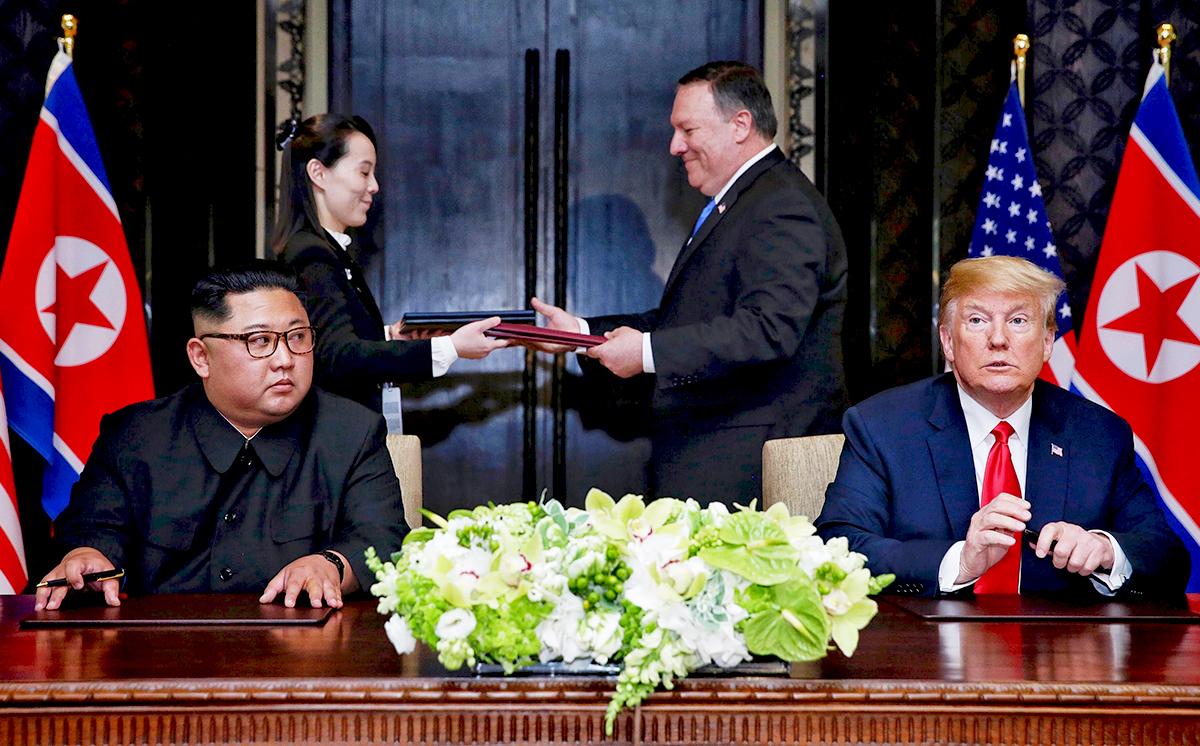North Korea cancels annual ‘anti-US’ rally as relations improve following Trump-Kim meeting
Demonstration usually kicks off month of anti-US events focused on the Korean War

In a sign of detente following the summit between leader Kim Jong-un and US President Donald Trump, North Korea has decided to skip one of the most symbolic and politically charged events of its calendar: the annual "anti-US imperialism" rally marking the start of the Korean War.
Fist-pumping, flag-waving and slogan-shouting masses of Pyongyang residents normally assemble each year for the rally to kick off a month of anti-US Korean War-focused events designed to strengthen nationalism and unity. It all culminates on 27 July, which North Korea celebrates as a national holiday called the day of "Victory in the Fatherland Liberation War".
Last year's event was held on Kim Il Sung Square with a reported 100,000 people attending. North Korea even issued special anti-US postage stamps.
Officials had no on-the-record comment on the decision not to hold the event this year. But Associated Press staff in the North Korean capital confirmed it would not be held.
North Korea has noticeably toned down its anti-Washington rhetoric over the past several months to create a more conciliatory atmosphere for the summit and avoid souring attempts by both sides to reduce tensions and increase dialogue.
State media were filled with reports, photos and video of the 12 June meeting between Mr Trump and Mr Kim in Singapore.
A 42-minute documentary-style news special was aired on the state television network two days after the summit and has been repeated frequently since, meaning that by now there are probably few North Koreans who are unaware of the changes in the air. For many North Koreans, the programme was also quite likely the first time they had ever seen what Mr Trump looks like.
Still, North Korea's handling of the changes and how it presents them to its people remains highly nuanced.
So far, it hasn't said much about what Washington is interested in the most — denuclearisation. But it has made significantly fewer references to its need to have nuclear weapons than it was making last year, when Mr Kim was test-launching long-range missiles at a record pace and tensions with Washington neared the boiling point.
Singapore Summit: historic first meeting between Trump and Kim Jong-un
Show all 20North Korea's decidedly less strident posture these days underscores the delicate position it finds itself in after decades of touting the United States as its archenemy.
State media referred to Mr Trump quite deferentially in their reports of the summit, calling him by his full name and adding the title of president of the United States of America — itself a somewhat jarring contrast to the way it normally spits out merely the surname of US officials, with no titles.
Considering how its relations with Washington could quickly slip back into acrimony if the difficult process of negotiating denuclearisation and the lifting of trade sanctions breaks down, it remains unclear how much, or if at all, North Korea intends to recalibrate its other propaganda and indoctrination efforts.
Getting rid of all the anti-American propaganda would be a Herculean task.
The 1950-53 Korean War, and the devastation the country suffered at the hands of the US and its allies, remain a major part of every North Korean's education.
Negative portrayals of Americans as big-nosed goblins are a common sight at elementary schools and kindergartens and exhortations to beware of American aggression, deceit and brutality are a staple message of textbooks and at "class education" centres around the country. Anti-American slogans can also still be seen in Pyongyang and throughout the countryside, though they are not that numerous.
And while softening its criticism of the current US administration, North Korea has stepped up its attacks on "capitalist values" in general — an oblique warning that its diplomatic outreach to the world should not be taken to mean it's ready to throw away its socialist ideals anytime soon.
In another sign of easing tensions, South Korea's prime minister Lee Nak-yon said that North and South Korea are discussing the possible relocation of the North's long-range artillery systems away from the tense Korean border. The country has deployed an estimated 1,000 artillery pieces along the border, posing a significant threat to Seoul, a capital city with 10 million people, and the metropolitan area.
Mr Lee said that "moving (North Korea's) long-range artillery to the rear is under discussion," as he explained what types of good-will steps between the sides have been taken in recent months.
His comments appear to be Seoul's first official confirmation of media reports that South Korea demanded that the North reposition its forward-deployed artillery pieces during inter-Korean military talks this month. Seoul's Defence Ministry, which has denied those reports, said it had no immediate comment on Mr Lee's speech.
South Korean media speculated that during the 14 June military talks, the North likely demanded that South Korea and the United States withdraw their own artillery systems from the border as a reciprocal measure. About 28,500 US soldiers are deployed in South Korea.
Last week, South Korea and the United States announced the suspension of their annual military exercises called the Ulchi Freedom Guardian, part of their efforts to increase the chances of successful nuclear diplomacy with North Korea. Some experts say the drills' suspension could weaken the allies' combined defence posture against North Korea.
Associated Press
Subscribe to Independent Premium to bookmark this article
Want to bookmark your favourite articles and stories to read or reference later? Start your Independent Premium subscription today.

Join our commenting forum
Join thought-provoking conversations, follow other Independent readers and see their replies